The Top 7… RPG towns that explode
Buy a few potions, chat up the locals and then watch it all burn
Exploded by: The Meteor called down by white-haired villain/geek sex symbolSephiroth.

Man, Midgar just fits all the criteria for a doomed city: Unchecked technological development, a stratified layout that confines poorer citizens to a crappy lower city, unmitigated hubris by the ruling class, environmental ruin, etc., etc. It’s practically begging to be destroyed, and pretty much the only surprise here is that its destruction doesn’t come until the very end of Final Fantasy VII.
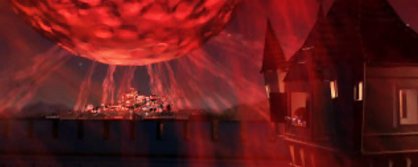
In spite of its faults, Midgar is one of the first immediate draws in Final Fantasy VII; it marks the first time the series went beyond its sword-and-sorcery roots, ditching medieval fantasy for a vibrant, modern city run by people in frigging business suits who still fight with swords.
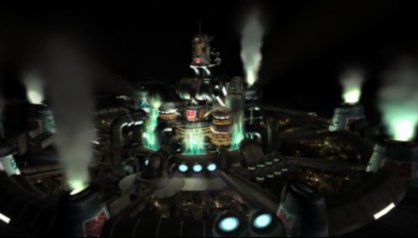
It’s also huge by the standards of any RPG town; beyond its sprawling upper and lower cities, there’sa freeway system with enough space to allow for a high-speed motorcycle chase.
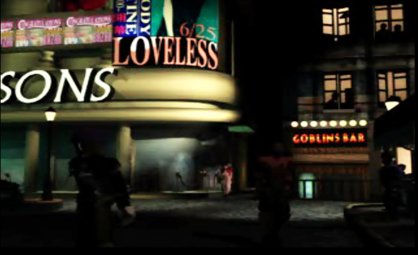
Above: The street corner that made 1995 gasp in awe
As awesome as it was, though, it was a betrayal of everything that Final Fantasy had been up to that point, which may be part of the reason it was marked for destruction. During the game’s strangely ambiguous ending, the Meteor summoned by villain Sephiroth hovers just a few hundred feet above the city, and despite his apparent death it’s sending down tornadoes of evil red energy that obliterate everything in their path.

Above: WHOOOMP
Sign up to the GamesRadar+ Newsletter
Weekly digests, tales from the communities you love, and more
Naturally, everyone’s terrified by this turn of events…
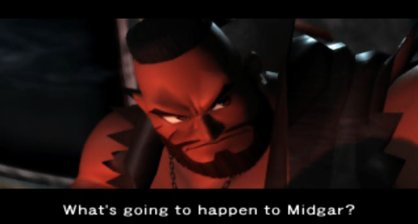
Above: EVEN BARRET
Just then, a convenient Deus ex Machina called Holy comes out of nowhere and….
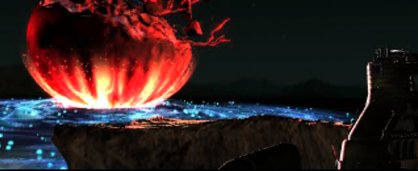
UTTERLY FAILS TO STOP THE METEOR.

Above: You should probably imagine the sound of a baby crowning here
Oh, but then another Deus ex Machina, this time in the form of the planet's "Lifestream,"comes along at the last possible second and saves the day.
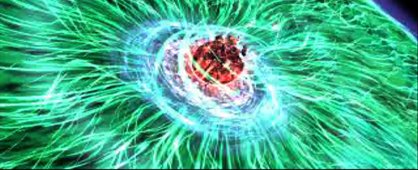
Above: NYEEOORRRMMMM
OR DOES IT!?!?

Above: DUNN DUNN DUNNNNNNN!
Well, yeah, it does. The Advent Children movie sort of proves that, as Midgar survives in a somewhat ruined state. But here, watch the original and decide for yourself:

The town: A tetanus hazard of a shantytown built in the impact crater made by an unexploded nuclear bomb in the middle of a blasted post-atomic wasteland.
Exploded by: You.
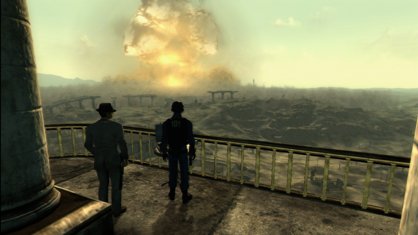
Before we knew anything substantial about Fallout 3, we knew this: when the game finally arrived, it would be possible to nuke an entire town. Since then, that’s arguably become the game’s defining trait; never mind the miles of wasteland, the little towns to explore or the overarching quest to restore clean water to D.C. Fallout 3 lets you decide whether or not to nuke an effing town.
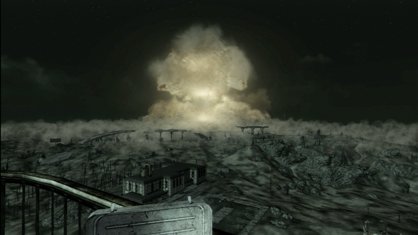
Above: We reiterate our earlier point
Of course, just because you can doesn’t necessarily mean you’ll want to. The little town of Megaton might be a literal hellhole, but its residents are good people who’ve found a pretty respectable way to survive in the middle of an endless desert filled with bandits and monsters.
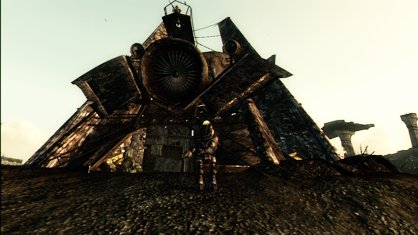
Above: The gates of Megaton, pre-nuking
That view isn’t shared by one Mr. Burke, who considers the town and its hardscrabble populace to be a degenerate blight on the landscape. He wants it all gone, and he wants you to be the one to make the town disappear.
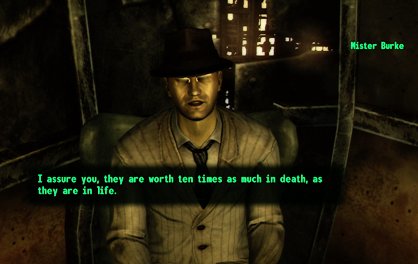
Above: Also he makes a pretty compelling case (if you’re psychotic)
All you need to do, says Burke, is head down to the center of town, where a radioactive idiot spends all day standing in front of a giant, undetonated mega-explosive, worshipping it like a god. Once there, you just need to apply a few charges, and then hoof it across the map until you’ve reached a safe detonating distance.
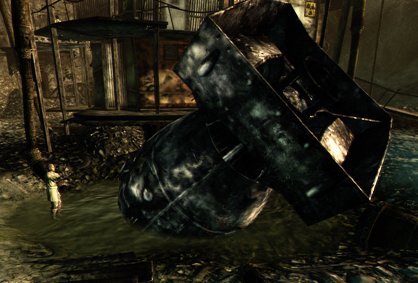
Above: This man must know what he’s doing
Now, you don’t have to do what Burke says. You could turn him in, and then kill him to prevent him from murdering the sheriff. Doing so would land you a free house in Megaton, where you could rest up and fill every available piece of furniture with the cheap Chinese assault rifles you find out in the wastes.
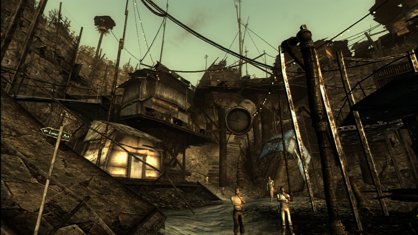
Above: Not only would you get to live here, but you’d have done a valuable community service!
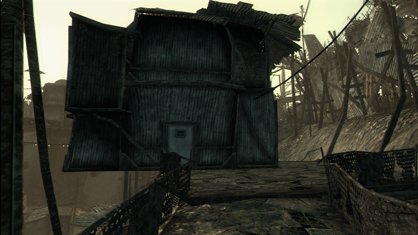
Above: Also this house is probably not about to collapse any minute now
Or you could go through with the plan, so long as you’re OK with the fact that it’s all for this guy, who just got tired of seeing Megaton as a speck on the horizon from one of his four balconies.
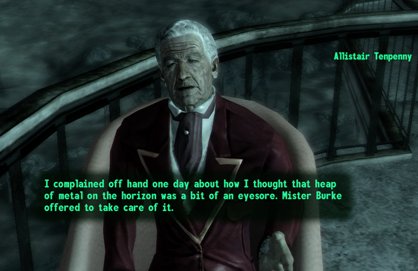
However, any moral concerns should be quickly put to rest by the knowledge that hey, you can nuke an entire town! And how often do you get to do that?
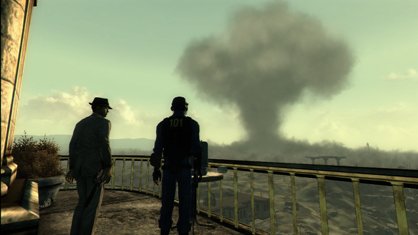
Above: Only once
If you’re feeling guilty afterward, you can return to the scene of the crime, which has been reduced to a highly radioactive rubble pile whose only interesting characteristic is the severed head of the robotic Deputy Weld, who will eternally bleat out garbled reassurances that the bomb is, in fact, perfectly safe. You can also chat up poor, sweet, alarmingly optimistic Moira Brown, who’s been turned into a horrific ghoul by your actions.
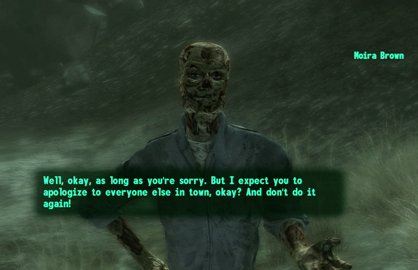
Above: This is probably the calmest reaction to an admission of mass murder ever
Out of all the other towns on this list, Megaton stands out the most – not because it was widely publicized, and not because it’s the most explosive and the most permanently destroyed, but because you’re the one who pulls the trigger. It’s entirely up to you whether the town survives or dies, and that, more than anything else, makes Megaton special.
And, you know, strangely fun to blow up.
May 18, 2009


Give a hoot: Read an article about eco-friendly games that embrace Mother Nature

The perfect storyline outlined and spoiled

RPG Emo-Off
From sighing to suicide – which JRPG character out-emos them all?



